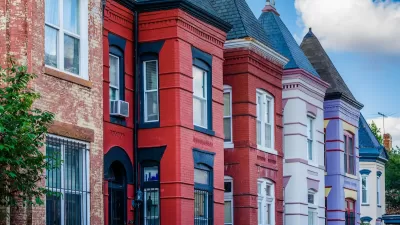Cities like Austin and Minneapolis are making major changes to their zoning codes to encourage housing construction, but New York’s proposed reforms are far less ambitious.

In a piece for The City, Samantha Maldonado explains how cities like Minneapolis and Austin have made far more ambitious zoning reforms than New York City in their efforts to encourage more housing development and bring down housing costs for their residents.
According to Maldonado, “Some parts of the original City of Yes proposal were from the onset less ambitious than elsewhere, while changes made as part of negotiations further scaled back the agenda.” The city says the plan could yield up to 80,000 new housing units, but modifications requested by City Council members will mitigate growth in some low-density neighborhoods, prompting criticism that the alterations ‘run counter to the initial promise of City of Yes to create “a little bit more housing in every neighborhood.’”
The proposed City of Yes plan would not allow duplexes or triplexes on lots zoned for single-family homes, while Minneapolis does. Minneapolis, Austin, Buffalo, and other cities have also scaled back or eliminated parking requirements, further reducing the cost of construction. While Columbus, Ohio allows buildings up to 16 stories tall near transit, New York’s plan would limit transit-adjacent building height to five stories in some neighborhoods.
FULL STORY: How Minneapolis and Austin Outdid New York City in the Quest to Enable More Housing

Planetizen Federal Action Tracker
A weekly monitor of how Trump’s orders and actions are impacting planners and planning in America.

Map: Where Senate Republicans Want to Sell Your Public Lands
For public land advocates, the Senate Republicans’ proposal to sell millions of acres of public land in the West is “the biggest fight of their careers.”

Restaurant Patios Were a Pandemic Win — Why Were They so Hard to Keep?
Social distancing requirements and changes in travel patterns prompted cities to pilot new uses for street and sidewalk space. Then it got complicated.

Platform Pilsner: Vancouver Transit Agency Releases... a Beer?
TransLink will receive a portion of every sale of the four-pack.

Toronto Weighs Cheaper Transit, Parking Hikes for Major Events
Special event rates would take effect during large festivals, sports games and concerts to ‘discourage driving, manage congestion and free up space for transit.”

Berlin to Consider Car-Free Zone Larger Than Manhattan
The area bound by the 22-mile Ringbahn would still allow 12 uses of a private automobile per year per person, and several other exemptions.
Urban Design for Planners 1: Software Tools
This six-course series explores essential urban design concepts using open source software and equips planners with the tools they need to participate fully in the urban design process.
Planning for Universal Design
Learn the tools for implementing Universal Design in planning regulations.
Heyer Gruel & Associates PA
JM Goldson LLC
Custer County Colorado
City of Camden Redevelopment Agency
City of Astoria
Transportation Research & Education Center (TREC) at Portland State University
Camden Redevelopment Agency
City of Claremont
Municipality of Princeton (NJ)





























